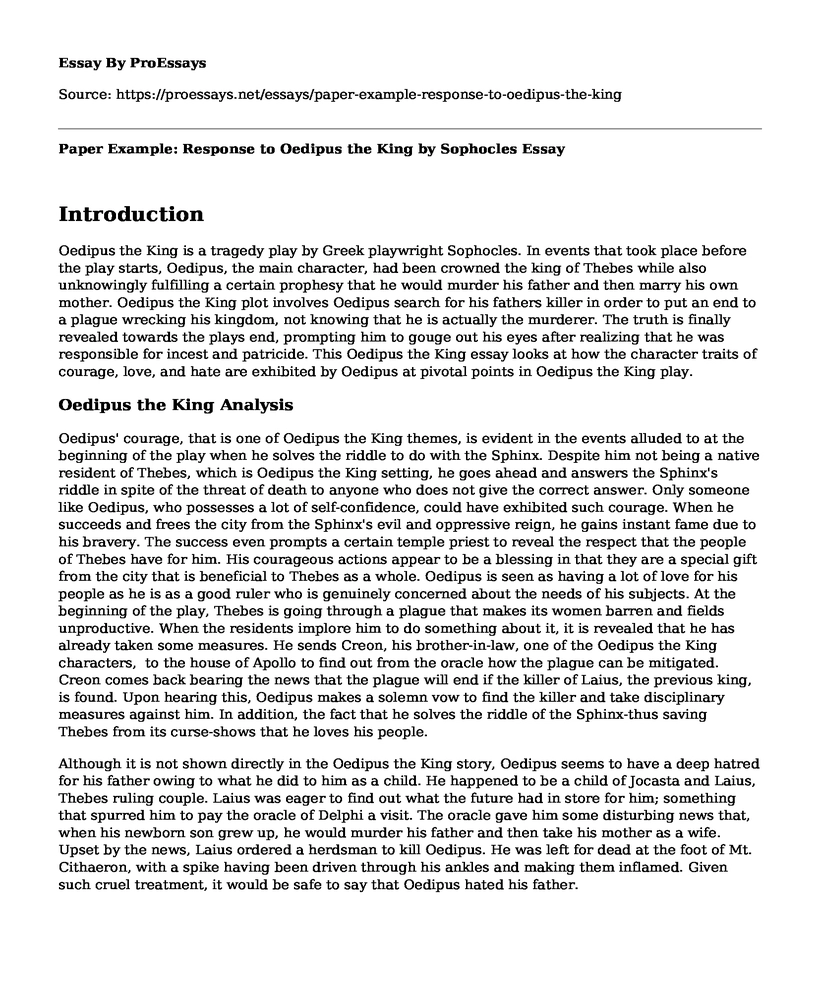Introduction
Oedipus the King is a tragedy play by Greek playwright Sophocles. In events that took place before the play starts, Oedipus, the main character, had been crowned the king of Thebes while also unknowingly fulfilling a certain prophesy that he would murder his father and then marry his own mother. Oedipus the King plot involves Oedipus search for his fathers killer in order to put an end to a plague wrecking his kingdom, not knowing that he is actually the murderer. The truth is finally revealed towards the plays end, prompting him to gouge out his eyes after realizing that he was responsible for incest and patricide. This Oedipus the King essay looks at how the character traits of courage, love, and hate are exhibited by Oedipus at pivotal points in Oedipus the King play.
Oedipus the King Analysis
Oedipus' courage, that is one of Oedipus the King themes, is evident in the events alluded to at the beginning of the play when he solves the riddle to do with the Sphinx. Despite him not being a native resident of Thebes, which is Oedipus the King setting, he goes ahead and answers the Sphinx's riddle in spite of the threat of death to anyone who does not give the correct answer. Only someone like Oedipus, who possesses a lot of self-confidence, could have exhibited such courage. When he succeeds and frees the city from the Sphinx's evil and oppressive reign, he gains instant fame due to his bravery. The success even prompts a certain temple priest to reveal the respect that the people of Thebes have for him. His courageous actions appear to be a blessing in that they are a special gift from the city that is beneficial to Thebes as a whole. Oedipus is seen as having a lot of love for his people as he is as a good ruler who is genuinely concerned about the needs of his subjects. At the beginning of the play, Thebes is going through a plague that makes its women barren and fields unproductive. When the residents implore him to do something about it, it is revealed that he has already taken some measures. He sends Creon, his brother-in-law, one of the Oedipus the King characters, to the house of Apollo to find out from the oracle how the plague can be mitigated. Creon comes back bearing the news that the plague will end if the killer of Laius, the previous king, is found. Upon hearing this, Oedipus makes a solemn vow to find the killer and take disciplinary measures against him. In addition, the fact that he solves the riddle of the Sphinx-thus saving Thebes from its curse-shows that he loves his people.
Although it is not shown directly in the Oedipus the King story, Oedipus seems to have a deep hatred for his father owing to what he did to him as a child. He happened to be a child of Jocasta and Laius, Thebes ruling couple. Laius was eager to find out what the future had in store for him; something that spurred him to pay the oracle of Delphi a visit. The oracle gave him some disturbing news that, when his newborn son grew up, he would murder his father and then take his mother as a wife. Upset by the news, Laius ordered a herdsman to kill Oedipus. He was left for dead at the foot of Mt. Cithaeron, with a spike having been driven through his ankles and making them inflamed. Given such cruel treatment, it would be safe to say that Oedipus hated his father.
Works Cited
Puchner, Martin, et al. The Norton Anthology of Western Literature, Volume 1. New York: W W Norton & Company Incorporated, 2014. Print.
Cite this page
Paper Example: Response to Oedipus the King by Sophocles. (2021, Apr 02). Retrieved from https://proessays.net/essays/paper-example-response-to-oedipus-the-king
If you are the original author of this essay and no longer wish to have it published on the ProEssays website, please click below to request its removal:
- Literary Analysis Essay on Country Driving by Peter Hessler
- Literary Analysis Essay on "Daystar" by Rita Dove
- The Value of Life - Essay Sample
- Literary Analysis Essay on Symbolism in Orwell's 1984
- Rachel Carson: From Nature Explorer to Renowned Environmental Author - Essay Sample
- Essay Sample on Macbeth's Dagger Vision: The Moment of Truth
- Gift of Love: Jim and Della's Sacrificial Christmas Gifts - Essay Sample







